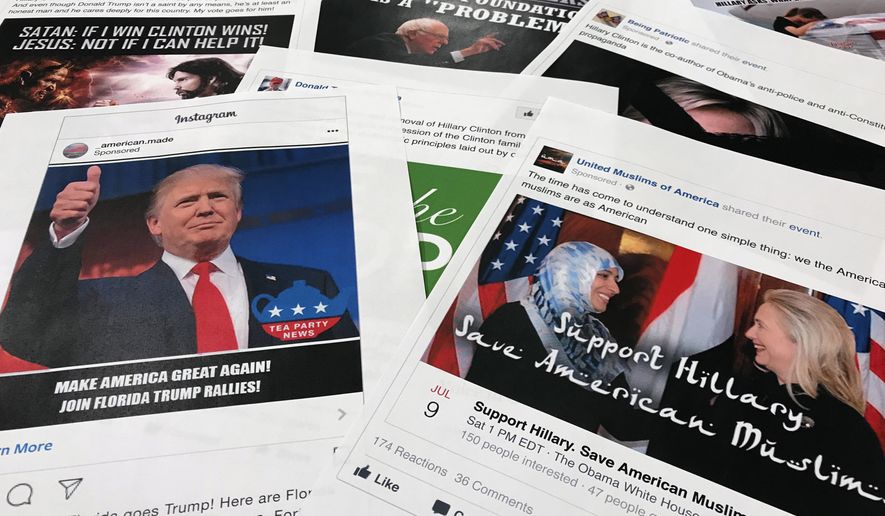Russian operatives used a massive social media campaign to try to dissuade minority voters from voting in the 2016 election, looking to assist then-candidate Donald Trump, according to two new studies done for Congress and released Monday.
The reports by Oxford University and New Knowledge detailed the St. Petersburg, Russia,-based Internet Research Agency’s years-long effort to pose as politically engaged Americans on social media to manipulate the electorate.
The New Knowledge report said they created a “fraudulent black media ecosystem” designed to encourage black voters to boycott elections or convince them of incorrect voting procedures. The Oxford report said a similar tactic is being used on Mexican-Americans and other Hispanic groups to sway them to mistrust the government.
The reports were sponsored by the Senate intelligence committee, which said they exposed the challenges social media posed.
“This newly released data demonstrates how aggressively Russia sought to divide Americans by race, religion and ideology, and how the [Internet Research Agency] actively worked to erode trust in our democratic institutions,” said Chairman Richard Burr, North Carolina Republican.
The reports said the Russian-backed operations began in 2013, and Oxford said activity increased “dramatically” beginning in late 2014, or well before Mr. Trump announced what was, at the time, a long-shot presidential bid.
But New Knowledge said the efforts developed a clear bias for Mr. Trump, attempting to disrupt his GOP opponents during the primary and continuing to target Trump foes now, including fired FBI director James Comey and special counsel Robert Mueller.
Hillary Clinton, meanwhile, faced steady opposition, with the Russians working to boost her primary opponent, Sen. Bernard Sanders, and later Green Party nominee Jill Stein.
Both reports found Russian efforts began on Twitter but said Instagram, a subsidiary of Facebook, was by far the hot spot.
New Knowledge found that app was best compatible with “memetic warfare.” Instagram had about 187 million engagements compared to the estimated 77 million on Facebook and 73 million on Twitter.
“Our assessment is that Instagram is likely to be a key battleground on an ongoing basis,” the report read.
Even platforms such as former video-sharing app Vine and video game Pokémon Go were targets.
The Oxford report said the Russians paid particular attention to black Americans, including setting up Facebook pages Blacktivist, Black Matters, BM, and Woke Blacks.
Smaller efforts were made toward Hispanics and Muslims, with messages “designed to push and pull them in different ways.”
“What is clear is that all of the messaging clearly sought to benefit the Republican Party — and specifically, Donald Trump,” while anti-Trump groups were hit with messages “that sought to confuse, distract, and ultimately discourage members from voting.”
The Oxford team said Russian political engagement increased six months after the 2016 election and targeted issues important to younger voters.
Rep. Adam Schiff, incoming House intelligence committee chairman, and Sen. Mark Warner, the Democratic vice chairman of the Senate panel, both called for Congress to step in.
“This should stand as a wakeup call to us all that none of us are immune from this threat, and it is time to get serious in addressing this challenge,” Mr. Warner of Virginia said in a statement. “I hope these reports will spur legislative action in the Congress and provide additional clarity to the American public about Russia’s assault on our democracy.”
Special counsel Robert Mueller tied the Internet Research Agency to Moscow in an indictment this year. He said the group had a goal of supporting Mr. Trump and “disparaging Hillary Clinton.”
• Gabriella Muñoz can be reached at gmunoz@washingtontimes.com.




Please read our comment policy before commenting.